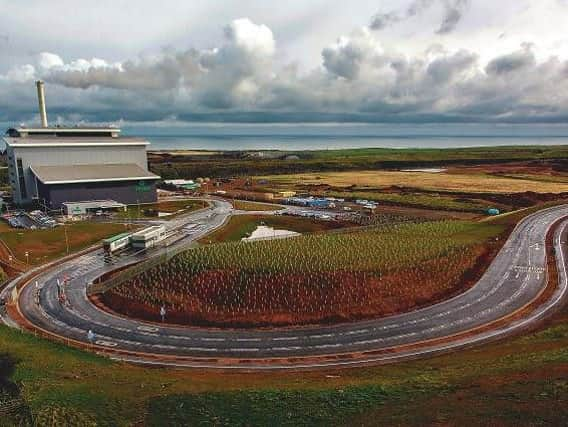Pioneering gas-cleaning project to cut emissions set up in East Lothian


The £2 million gas-cleaning project being pioneered at the 193-acre Viridor rubbish dump near Dunbar will produce enough fuel each year to power a truck for 34,000 miles and avoid around 380 tonnes of carbon being released into the atmosphere.
The process will see methane, a potent greenhouse gas produced when rubbish decomposes, converted into bio-liquified natural gas (Bio-LNG).
Advertisement
Hide AdAdvertisement
Hide AdCarbon dioxide will also be captured during the process then sold on for use in agriculture or the chemical and manufacturing industries.
The technique involves stripping out carbon dioxide and other contaminants from the methane content of landfill gas and regenerating it at low temperature to create the bio-gas, according to Marcus Du Pree Thomas, head of innovation and technology at Viridor.
He said: “Once the gas has been liberated from landfill this energy-efficient CO2 scrubbing process can be used to create a transport fuel with future applications, including supply agreements with UK filling stations and the CO2 successfully captured and harnessed for third party applications.
“This is an incredibly efficient process, with the methane gas cleaned to fuel grades in a matter of minutes and a landfill site like Dunbar, currently producing 2,500 cubic metres per hour of gas, capable of creating transport fuel which would run for 34,000 truck miles per year.”
Advertisement
Hide AdAdvertisement
Hide AdThe fuel can replace diesel in heavy goods vehicles that have been specially converted to run on the gas.
Gas conversion operations will use energy drawn from Viridor’s £177 million new energy recovery facility in Dunbar, which generates green electricity and heat from household waste at the landfill site.
When fully integrated, the East Lothian plant could generate carbon savings of 380 tonnes a year compared to diesel, Thomas says.
Viridor is working with Dutch firm CarbonOrO on the ground-breaking initiative.
Advertisement
Hide AdAdvertisement
Hide AdWork to install the new plant facilities will begin at the site early next year, with production to start by summer 2020.
Environmental, resource and energy-efficiency ambitions
Viridor managing director Phil Piddington said: “This is in keeping with Viridor’s ethos of putting waste to work and creating valuable resources which actively help the UK achieve its environmental, resource and energy-efficiency ambitions.
“Converting landfill gas into transport fuels is exactly the right vehicle for realising these goals and, the fact that the process draws on heat provided by the co-located ERF sees this facility coming into its own as a combined heat and power plant. “
He added: “We look forward to the Dunbar commercialisation delivering results which will enable us to use CarbonOrO’s unique technique across our portfolio of landfill sites.
Advertisement
Hide AdAdvertisement
Hide Ad“This investment in innovative technology is also an important development for the closed landfill sites.”
CarbonOrO general manager Pieter Verberne says the new scheme is a “landmark innovation project” that recognises the potential of landfill and the gas cleaning process.
He said: “The Dunbar project is the ultimate demonstration of this vision.”
The ERF generates enough renewable electricity to power 70,656 homes.